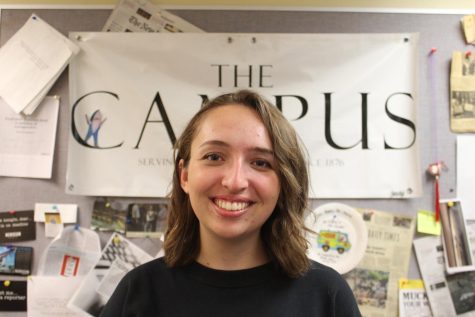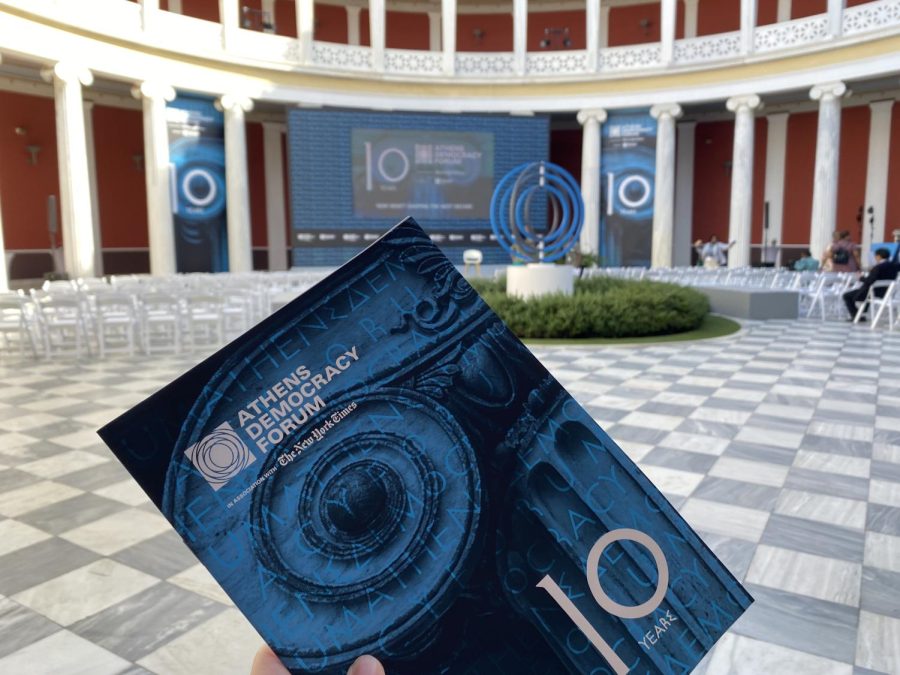Athens Democracy Forum: Opinion editor reflects on international conference
Two weeks ago, I was Allegheny’s delegate at the Athens Democracy Forum, an opportunity granted through the college’s membership in the Global Liberal Arts Alliance. Together with twenty-odd students hailing from Ohio to Slovakia to Ecuador and beyond, I spent three days around some of the most beautiful sites in Athens — the Stoa, the Academy, the Zappeion — listening to the 21st century’s brightest minds unpack challenges democracy currently faces. Bookending the actual forum itself were lectures, discussions and workshops for the cohort of GLAA students through the American College of Greece. I met interesting people, I learned a few words in Greek and I ate my body weight in tzatziki. All in all, I had a great week.
When I first committed to writing this article, I told the editors that I would have “something” to give them about the ADF. I was hoping that I could report back about the state of democracy around the world or the groundbreaking claims made right before my eyes. I have quickly discovered that it is nearly impossible to write such an objective report in an engaging way without resorting to editorializing. Besides, there is much to unpack from my three days at the ADF. It would be a disservice to write a play-by-play account — the entire event has been published on YouTube by now and is free to all. I’m the Opinion Editor; opine I shall.
For three days, I heard again and again about an enigmatic gang — The Youth. The Youth need a voice. The Youth are unreachable. The Youth have a new way of doing things that we do not understand. The Youth are concerned with things beyond our ken. They seemed like a mercurial and terrifying bunch, able to effect change in the world yet too lazy or addicted to TikTok to care. Imagine my surprise when I discovered that I am a member of this horde.
Throughout the entire forum, The Youth were repeatedly and frequently mentioned but very rarely engaged in the events. It was hard not to feel as if we were there as props — demographically-mandated seat-fillers that allowed ADF attendees to rest easy in the belief that they are engaging in a truly democratic conversation about democracy. It is telling that, at a forum solely concerned with liberal, representative democracy, none of the so-called Youth were members of a panel entitled “Bridging the Intergenerational Gap” — they were only afforded the opportunity to ask the panelists questions. It is even more telling that one of the panelists argued that young people should not be given a seat at the political table and was met with applause by the room.
This is not to say that we were neglected. Over the summer, the GLAA delegates worked to synthesize our individual thoughts on panel topics into a one-minute-long video. A handful were selected to represent the “Youth Perspective” at the Forum and were played before their relevant panels. My video about banning the algorithm was shown before “Rethinking Media: Truthsayers and Naysayers,” a panel about disinformation, journalism and social media.
As the saying goes, I was just happy to be nominated, and obviously glad that my opinions were shared before a wider audience of journalists, politicians and intellectuals. But there is something slightly insulting — some small bit of tokenism — that comes with your hours of hard thinking and writing being reduced to “The Youth Perspective.”
I do not believe that any single person at the Forum would declare themselves as representative of an entire larger demographic. Roger Cohen does not represent every journalist on the planet. Jeffrey Sachs does not represent all economists. Ban Ki-moon would not claim to represent all South Koreans, or even all former U.N. Secretaries General.
Likewise, my Youth Perspective was that the algorithm should be banned, but I am sure that there are plenty of people my age who think the algorithm is great — it streamlines their information intake and optimizes their time on sites like Instagram and TikTok. In the eyes of those who assemble an event like ADF, though, we are an intellectual and cultural monolith with our smartphones and slang. We are all The Youth — a demeaning title that, on top of everything else, makes me feel like I’m a delinquent in “West Side Story.”
This is all part of a bigger problem with the ADF: It is designed, predominantly, as a round of applause for the democratic world. The panels were quick and snappy; they left no time for questions or comments at the end. There were plenty of scathing hypotheses put forth, from the United States’s culpability for global conflict to the role of late-stage capitalism in destroying independent journalism, but there were few productive solutions attached to these sound bites — just a lot of enthusiastic applause.
I could not help but think that, aside from a few small-group workshops, the entire event was an expensive, bespoke gauntlet constructed to celebrate how much we love talking about collaboration rather than actually collaborating. I suppose that, given the state of democracy today, this was actually right on the nose — a lot of noise and no action.
Along the same lines, one of my favorite adages of the ADF was that we “need more education.” Education will solve the voter crisis. It will eradicate disinformation from the face of the planet, end the war in Ukraine and halt climate change in its tracks. Sure.
I am not knocking the power of education — I agree that the abstract concept of delivering more knowledge to those who lack it is likely a way to combat the anti-intellectual bend of the problems democracy faces. However, I was hard-pressed to get anybody preaching about the need for education to outline just how, exactly, this education could be delivered. Do we reform public education? Drastically change our curricula? Drop informative pamphlets over rural areas from the sky?
Nobody knows, and nobody wants to think about it. At the ADF, it is enough to say that we need something and leave it at that. Hopefully, some bright upstart in the room — maybe even a member of The Youth — will latch onto the idea and go out and change the world.
The days I spent with the other GLAA delegates were more productive and insightful than the forum itself. In the library of ACG, we shared our perspectives on Forum topics — perspectives which, I might add, were almost always unique to individual experiences and backgrounds — and proposed practical, actionable solutions to the problems that plagued our cities, states and nations. I learned about democracy in Japan and Kenya. I taught people about the Electoral College — the collective opinion: It is outdated. As a group, we quickly discovered that there are no blanket approaches to democracy: What may work as a positive democratic tool in Greece may only lead to negative outcomes in Saudi Arabia; what may help somebody from Morocco may harm somebody from the United States.
The world is vast and complicated. I thought I understood the extent of its complexity before my time in Greece. I have never been more delighted to be proven wrong. If the ADF organizers could take a cue from the GLAA and the remarkable students with whom I worked for a week, then true progress may be within our reach. Until then, it will just be another litany of catered lunches and sedate speeches.
That is my Youth Perspective.

Sydney Emerson is a member of the class of 2023. She is from Bradford, Pennsylvania and is an English major with a history minor.








